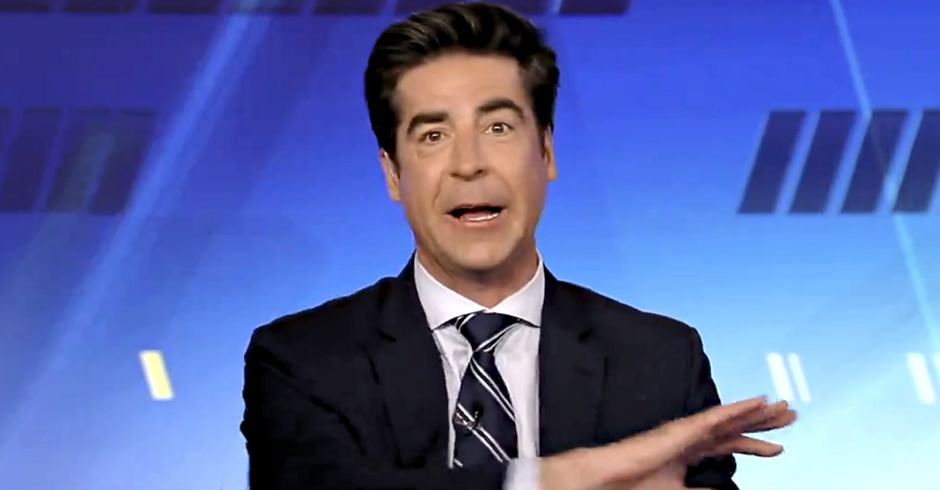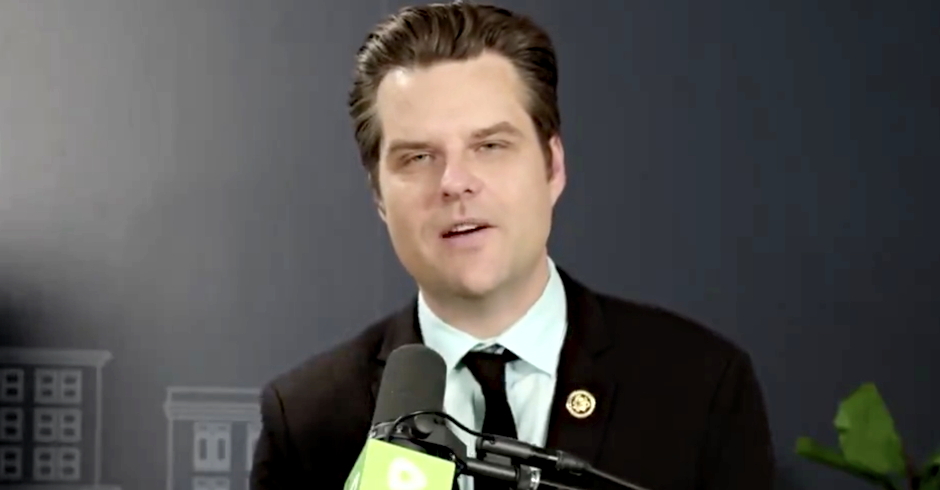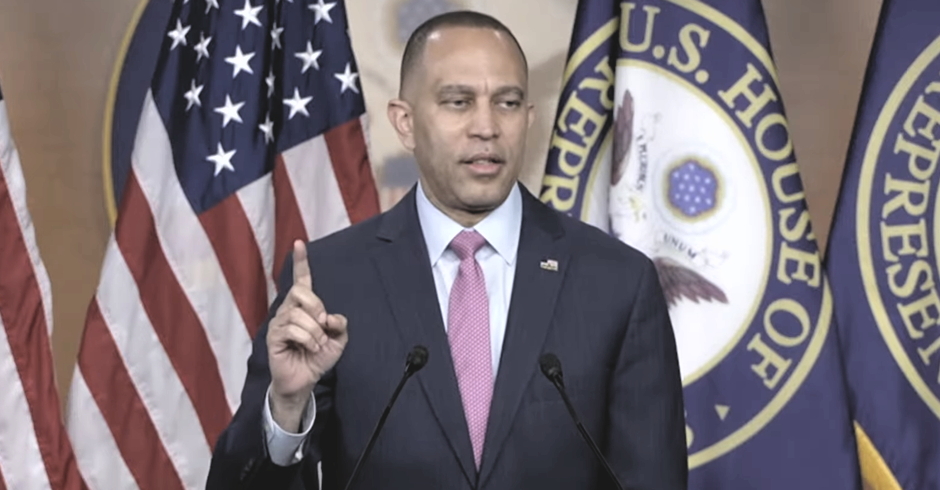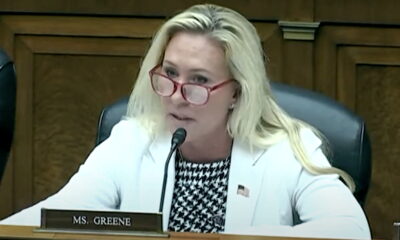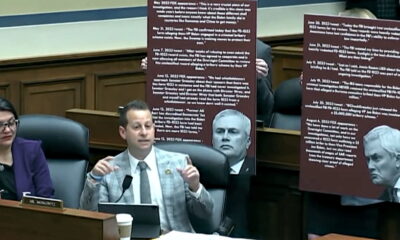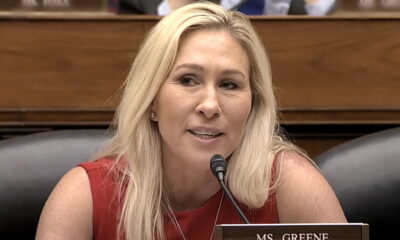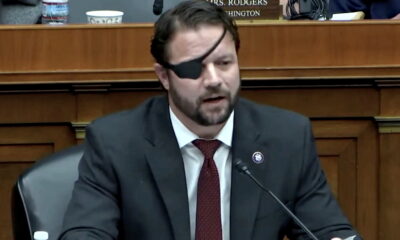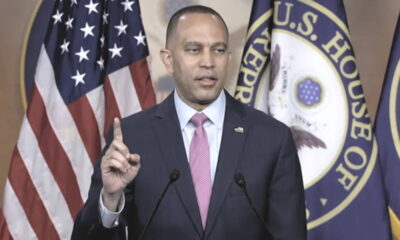Obama: Chamber Of Commerce, AFL-CIO “Aren’t Exactly Facebook Friends”
President Obama today spoke to the U.S. Chamber of Commerce (you know, those folks who are skirting the law regarding international donations to fund elections and candidates, and who oppose health care reform…) He did a superb job of attempting to reach out and meet them more than half-way. And, he made a few jokes. Like these:
“I’ve proposed connecting 80 percent of the country to high-speed rail, and making it possible for companies to put high-speed internet coverage in reach of virtually all Americans.
“You understand the importance of this. The fact is, the Chamber of Commerce and the AFL-CIO don’t agree on a whole lot. Tom Donohue and Richard Trumka aren’t exactly Facebook friends.”
And,
“It’s good to be here today at the Chamber of Commerce. I’m here in the interest of being more neighborly. Maybe we would have gotten off on a better foot if I had brought over a fruitcake when we first moved in.”
Here’s the full text:
Remarks of President Barack Obama – As Prepared for Delivery
To the Chamber of Commerce
Monday, February 7, 2011
Washington, DC
Thank you, Tom, for your introduction. It’s good to be here today at the Chamber of Commerce. I’m here in the interest of being more neighborly. Maybe we would have gotten off on a better foot if I had brought over a fruitcake when we first moved in.
The truth is, this isn’t the first time I’ve been to the Chamber, or the first time we’ve exchanged ideas. Over the last two years, I’ve sought advice from many of you as we were grappling with the worst recession most of us have ever known. It’s a recession that led to some very difficult decisions. For many of you, that meant restructuring and branch closings and layoffs that were painful to make. For my administration, it meant a series of emergency measures I wouldn’t have taken under normal circumstances, but that were necessary to stop our economy from falling off the cliff.
Now, on some issues, like the Recovery Act, we’ve found common cause. On other issues, we’ve had some pretty strong disagreements. But I’m here today because I’m convinced we can and must work together. Whatever differences we may have, I know that all of us share a deep belief in this country, our people, and the principles that have made America’s economy the envy of the world.
America’s success didn’t happen by accident. It happened because of the freedom that has allowed good ideas to flourish, and capitalism to thrive. It happened because of the conviction that in this country, hard work should be rewarded; that opportunity should be there for anyone willing to reach for it. And it happened because at every juncture in history, we came together as one nation and did what was necessary to win the future.
That is our challenge today.
We still have, by far, the world’s largest and most vibrant economy. We have the most productive workers, the finest universities and the freest markets. The men and women in this room are living testimony that American industry is still the source of the most dynamic companies, and the most ingenious entrepreneurs.
But we also know that with the march of technology over the last few decades, the competition for jobs and businesses has grown fierce. The globalization of our economy means that businesses can now open up shop, employ workers and produce their goods wherever there is internet connection. Tasks that were once done by 1,000 workers can now be done by 100, or even 10. And the truth is, as countries like China and India grow and develop larger middle classes, it’s profitable for global companies to aggressively pursue these markets and, at times, to set up facilities in these countries.
These forces are as unstoppable as they are powerful. But combined with a brutal and devastating recession, they have also shaken the faith of the American people – in the institutions of business and government. They see a widening chasm of wealth and opportunity in this country, and they wonder if the American Dream is slipping away.
We cannot ignore these concerns. We have to renew people’s faith in the promise of this country – that this is a place where you can make it if you try. And we have to do this together: business and government; workers and CEOs; Democrats and Republicans.
We know what it will take for America to win the future. We need to out-innovate, out-educate, and out-build our competitors. We need an economy that’s based not on what we consume and borrow from other nations, but what we make and sell around the world. We need to make America the best place on earth to do business.
And this is a job for all of us. As a government, we will help lay the foundation for you to grow and innovate. We will upgrade our transportation and communications networks so you can move goods and information more quickly and cheaply. We will invest in education so that you can hire the most skilled, talented workers in the world. And we’ll knock down barriers that make it harder for you to compete, from the tax code to the regulatory system.
But I want to be clear: even as we make America the best place on earth to do business, businesses also have a responsibility to America.
Now, I understand the challenges you face. I understand that you’re under incredible pressure to cut costs and keep your margins up. I understand the significance of your obligations to your shareholders. I get it. But as we work with you to make America a better place to do business, ask yourselves what you can do for America. Ask yourselves what you can do to hire American workers, to support the American economy, and to invest in this nation. That’s what I want to talk about today – the responsibilities we all have to secure the future we all share.
As a country, we have a responsibility to encourage American innovation. Companies like yours have always driven the discovery of new ideas and new products. But, as you know, it’s not always profitable in the short-term for you to invest in basic research. That’s why government has traditionally helped invest in this kind of science, planting the seeds that ultimately grew into technologies from computer chips to the internet.
And that’s why we’re making investments today in the next generation of big ideas – in biotechnology, information technology, and clean energy technology. We’re reforming our patent system so innovations can move more quickly to market. Steve Case is heading up a new partnership called Startup America to help entrepreneurs turn new ideas into new businesses and new jobs. And I’ve also proposed a bigger, permanent tax credit for all the research and development your companies do in this country.
We also have a responsibility as a nation to provide our people and our businesses with the fastest, most reliable way to move goods and information. The costs to business from the outdated and inadequate infrastructure we currently have are enormous. That’s why I want to put more people to work rebuilding crumbling roads and bridges. And that’s why I’ve proposed connecting 80 percent of the country to high-speed rail, and making it possible for companies to put high-speed internet coverage in reach of virtually all Americans.
You understand the importance of this. The fact is, the Chamber of Commerce and the AFL-CIO don’t agree on a whole lot. Tom Donohue and Richard Trumka aren’t exactly Facebook friends. But they agree on the need to build a 21st century infrastructure. And I want to thank the Chamber for pushing Congress to make more infrastructure investments, and to do so in the most cost-effective way possible: with tax dollars that leverage private capital, and with projects determined not by politics, but by what’s best for our economy.
The third responsibility we have as a nation is to invest in the skills and education of our people. If we expect companies to do business and hire in America, America needs a pool of trained, talented workers that can out-compete anyone in the world. That’s why we’re reforming K-12 education and training 100,000 new math and science teachers. That’s why we’re making college more affordable, and revitalizing community colleges.
Recently, I visited GE in Schenectady, New York, which has partnered with a local community college. While students train for jobs available at the nearby GE plant, they earn a paycheck and have their tuition covered. As a result, young people can find work. GE can fill high-skilled positions. And the entire region has become more attractive to businesses. It’s win-win for everyone, and something we’re trying to replicate across the country.
To make room for these investments in education, innovation, and infrastructure, government also has a responsibility to cut the spending that we just can’t afford. That’s why I’ve promised to veto any bill larded up with earmarks. And that’s why I’ve proposed that we freeze annual domestic spending for the next five years, which would reduce the deficit by more than $400 billion over the next decade, and bring this spending down to the lowest share of our economy since Eisenhower was president. And I am eager to work with both parties to take additional steps across the budget to put our nation on sounder fiscal footing.
In addition to making government more affordable, we’re also making it more effective and customer-friendly. We’re trying to run the government more like you run your businesses – with better technology and faster services. In the coming months, my administration will develop a proposal to merge, consolidate, and reorganize the federal government in a way that best serves the goal of a more competitive America. And we want to start with the twelve different agencies that deal with America’s exports. If we hope to help our businesses sell more goods around the world, we should ensure we are all pulling in the same direction.
This brings me to the final responsibility of government: breaking down barriers that stand in the way of your success. As far as exports are concerned, that means seeking new opportunities and opening new markets for your goods. I’ll go anywhere to be a booster for American businesses, American workers, and American products. We recently signed export deals with India and China that will support more than 250,000 jobs here in the United States. And we finalized a trade agreement with South Korea that will support at least 70,000 American jobs – a deal that has unprecedented support from business and labor; Democrats and Republicans. That’s the kind of deal I’ll be looking for as we pursue trade agreements with Panama and Columbia and work to bring Russia into the international trading system.
Another barrier government can remove is a burdensome corporate tax code with one of the highest rates in the world. You know how it goes: because of various loopholes and carve-outs that have built up over the years, some industries pay an average rate that is four or five times higher than others. Companies are taxed heavily for making investments with equity; yet the tax code actually pays companies to invest using leverage. As a result, too many businesses end up making decisions based on what their tax director says instead of what their engineer designs or what their factory produces. This puts our entire economy at a disadvantage. That’s why I want to lower the corporate rate and eliminate these loopholes to pay for it, so that it doesn’t add a dime to our deficit. And I am asking for your help in this fight.
The last barriers we’re trying to remove are outdated and unnecessary regulations. I’ve ordered a government-wide review, and if there are rules on the books that are needlessly stifling job creation and economic growth, we will fix them. Already we’re dramatically cutting down on the paperwork that saddles businesses with huge administrative costs. We’re improving the way FDA evaluates things like medical devices, to get innovative and life-saving treatments to market faster. And the EPA, based on the need for further scientific analysis, delayed the greenhouse gas permitting rules for biomass. I’ve also ordered agencies to find ways to make regulations more flexible for small businesses. And we’ve turned a tangle of fuel economy regulations and pending lawsuits into a single standard that will reduce our dependence on foreign oil, save consumers money at the pump, and give car companies the certainty they need.
But ultimately, winning the future is not just about what the government can do to help you succeed. It’s about what you can do to help America succeed.
For example, even as we work to eliminate burdensome regulations, America’s businesses have a responsibility to recognize that there are some safeguards and standards that are necessary to protect the American people from harm or exploitation.
Few of us would want to live in a society without the rules that keep our air and water clean; that give consumers the confidence to do everything from investing in financial markets to buying groceries. Yet when standards like these have been proposed, opponents have often warned that they would be an assault on business and free enterprise. Early drug companies argued that the bill creating the FDA would “practically destroy the sale of … remedies in the United States.†Auto executives predicted that having to install seatbelts would bring the downfall of their industry. The President of the American Bar Association denounced child labor laws as “a communistic effort to nationalize children.â€
Of course, none of this has come to pass. In fact, companies adapt and standards often spark competition and innovation. Look at refrigerators. The government set modest targets to increase efficiency over time. Companies competed to hit these markers. And as a result, a typical fridge now costs half as much and uses a quarter of the energy it once did, saving families and businesses billions of dollars.
Moreover, the perils of too much regulation are matched by the dangers of too little. We saw that in the financial crisis, where the absence of sound rules of the road was hardly good for business. That’s why, with the help of Paul Volcker who is here today, we passed a set of commonsense reforms. The same can be said of health insurance reform. We simply could not continue to accept a status quo that’s made our entire economy less competitive, as we’ve paid more per person for health care than any other nation on earth. And we could not accept a broken system where insurance companies could drop people because they got sick, or families went bankrupt because of medical bills.
I know you have concerns about this law. But the non-partisan congressional watchdogs at the CBO estimate that health care tax credits will be worth nearly $40 billion for small businesses over the next decade. And experts – not just from the government, but also those commissioned by the Business Roundtable – suggest that health insurance reform could ultimately save large employers anywhere from $2,000 to $3,000 per family. I’m also willing to look at other ideas to improve the law, including incentives to improve patient safety and medical malpractice reforms. And as I said in the State of the Union, I want to correct a flaw that has placed an unnecessary bookkeeping burden on small businesses, and I appreciate the Chamber’s help in doing that.
Of course, your responsibility goes beyond recognizing the need for certain standards and safeguards. If we’re fighting to reform the tax code and increase exports to help you compete, the benefits can’t just translate into greater profits and bonuses for those at the top. They should be shared by American workers, who need to know that expanding trade and opening markets will lift their standard of living as well as your bottom line. We cannot go back to the kind of economy – and culture – we saw in the years leading up to the recession, where growth and gains in productivity just didn’t translate into rising incomes and opportunity for the middle class.
And if we as a nation are going to invest in innovation, that innovation should lead to new jobs and manufacturing on our shores. The end result of tax breaks and investments cannot simply be that new breakthroughs and technologies are discovered in America, but manufactured overseas.
The key to our success has never been just developing new ideas; it’s also been making new products. Intel pioneers the microchip, and puts thousands to work building them in Silicon Valley. Henry Ford perfects the assembly line, and puts a generation to work in the factories of Detroit. This is how we built the largest middle-class in the world. And this is how we’ll create the base of knowledge and skills that propel the next invention, the next idea.
Right now, businesses across this country are proving that America can compete. Caterpillar is opening a new plant to build excavators in Texas that used to be shipped from Japan. In Tennessee, Whirlpool is opening their first new US factory in more than a decade. Dow is building a new plant in Michigan to manufacture batteries for electric vehicles. A company called Geomagic, a software maker, decided to close down its overseas centers in China and Europe and move their R&D to the United States. These are companies bringing jobs back to our shores.
Now is the time to invest in America. Today, American companies have nearly $2 trillion sitting on their balance sheets. I know that many of you have told me that you are waiting for demand to rise before you get off the sidelines and expand, and that with millions of Americans out of work, demand has risen more slowly than any of us would like.
But many of your own economists and salespeople are now forecasting a healthy increase in demand. So I want to encourage you to get in the game. And part of the bipartisan tax deal we negotiated, businesses can immediately expense 100 percent of their capital investments. As you all know, it’s investments made now that will pay off as the economy rebounds. And as you hire, you know that more Americans working means more sales, greater demand, and higher profits for your companies. We can create a virtuous cycle.
And if there is a reason you don’t share my confidence, if there is a reason you don’t believe that this is the time to get off the sidelines – to hire and invest – I want to know about it. I want to fix it. That’s why I’ve asked Jeff Immelt of GE to lead a new council of business leaders and outside experts so that we’re getting the best advice on what you’re facing out there – and we’ll be holding our first meeting two weeks from now, on the 24th. Together, I am confident that we can win the competition for new jobs and industries. And I know you share my enthusiasm; I know you love this country and want America to succeed just as badly as I do.
Yes, we’ll have disagreements; yes we will see things differently at times. But we are all Americans. And that spirit of patriotism, that sense of mutual regard and common obligation has carried us through times far harder than these.
Toward the end of the 1930s, amidst depression and the looming prospect of war, President Roosevelt realized he would need to form a new partnership with business if we were going to become what he would call the “arsenal of democracy.†As you could imagine, the relationship between the president and business leaders had grown somewhat fractured over the New Deal. So Roosevelt reached out to businesses; and business leaders answered the call to serve their country. After years of fighting each other, the result was one of the most productive collaborations between the public and private sectors in American history.
Some, like the head of GM, hadn’t previously known the president. If anything, he had been an adversary. But he gathered his family and explained that he was going to head up what would become the War Production Board.
“This country has been good to me,†he said. “I want to pay it back.â€
In the years that followed, automobile factories converted to making planes and tanks. Corset factories made grenade belts. A toy company made compasses. A pinball machine maker turned out shells. 1941 would see the greatest expansion of manufacturing in the nation’s history. And not only did this help us win the war. It led to millions of new jobs and helped produce the great American middle class.
We have faced hard times before. We have faced moments of tumult and change before. We know what to do. We know how to succeed. We are Americans. And as we have throughout our history, I have every confidence that will rise to this occasion; that we can come together, that we can adapt and thrive in a changing economy. And we need look no further than the innovative companies in this room. If we can harness your potential and the potential of the people all across our country, there will be no stopping us.
Thank you. God bless you. And may God bless the United States of America.

Enjoy this piece?
… then let us make a small request. The New Civil Rights Movement depends on readers like you to meet our ongoing expenses and continue producing quality progressive journalism. Three Silicon Valley giants consume 70 percent of all online advertising dollars, so we need your help to continue doing what we do.
NCRM is independent. You won’t find mainstream media bias here. From unflinching coverage of religious extremism, to spotlighting efforts to roll back our rights, NCRM continues to speak truth to power. America needs independent voices like NCRM to be sure no one is forgotten.
Every reader contribution, whatever the amount, makes a tremendous difference. Help ensure NCRM remains independent long into the future. Support progressive journalism with a one-time contribution to NCRM, or click here to become a subscriber. Thank you. Click here to donate by check.
 |
